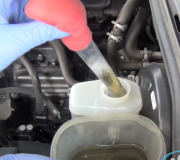Hey guys. Before you open that bleeder screw, wash all of that penetrating oil off with brake parts cleaner or carburetor cleaner. That stuff works by soaking in through the threads. The last thing you want is any type of petroleum product getting mixed in with brake fluid. That will contaminate the entire hydraulic system requiring the replacement of every part that has rubber parts inside, and you must flush and dry all the steel lines. If the car has anti-lock brakes, the cost of repairs will easily exceed the value of the car.
At this point I would replace both front calipers, the left one for the penetrating oil and the right one so they're a matched pair for even braking. Other things you can try if you're emotionally involved with that caliper is banging on the casting right next to the bleeder screw to deform it enough to break the bond at the threads, or welding a nut to the bleeder screw. I can describe that better but you'll need an acetylene torch and a wire feed welder. The nut will give you a solid place to put a six-point socket but if it's that tight it is likely just going to twist off anyway. The remaining part can be drilled out, retapped, then an insert can be installed with its own bleeder screw but few people do that today because professionally rebuilt calipers are so inexpensive compared to 20 years ago.
If you do get the bleeder screw out you might consider burning off the remaining penetrating oil with a propane torch. Cast iron is porous and some of that oil is going to soak in and leach out later.
You don't have to do anything special for bleeding. If you get the bleeder screw out, gravity is going to be drawing fluid down from the reservoir and the air will come out. If it doesn't, just loosen the reservoir cap a little. I would definitely go for new calipers before that penetrating oil has time to work its way in, and even then, just loosen the reservoir cap a little and let both calipers gravity bleed. If fluid doesn't start running down on its own, irritate the brake pedal a few times by hand to get it started. Once all the air is out, close the bleeders, then pump the pedal until the pads contact the rotors, then open each bleeder for a few seconds to remove the last few little air bubbles that washed into the calipers.
Do not ever push the brake pedal more than half way to the floor. Doing so can damage the internal lip seals, and on GM front-wheel-drive cars with the split-diagonal hydraulic system, it can trip a valve that will block fluid flow to one front and the opposite rear wheel.
Wednesday, May 30th, 2012 AT 10:58 PM



